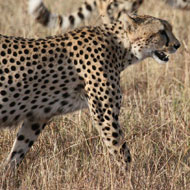Calls to list cheetah as 'endangered'

Owing to the cheetah's elusive nature, it is difficult to gather hard evidence on the species, meaning its plight has been overlooked.
Cheetahs may be far more vulnerable to extinction than previously thought, according to the most comprehensive analysis of their status to date.
Scientists are now calling for the species to be up-listed from 'vulnerable' to 'endangered' on the IUCN red list of threatened species, giving it greater international conservation support.
The study, led by ZSL, Wildlife Conservation Society and Panthera, estimates that just 7,100 cheetahs remain in the world, inhabiting nine per cent of the species historic range. Asiatic cheetah populations are thought to be struggling the most, with less than 50 individuals left in one pocket of Iran.
Unless urgent, landscape-wide conservation action is taken, the species could be lost forever, scientists warn. Their findings have been published in the journal PNAS.
Owing to the cheetah's elusive nature, it is difficult to gather hard evidence on the species, meaning its plight has been overlooked. But lead author Dr Sarah Durant explains the species is likely to be much more vulnerable than previously known.
The degree of persecution it faces inside and outside of protected areas is largely unrecognised - threats include human-wildlife conflicts, prey loss due to overhunting by humans, habitat loss and illegal trafficking of cheetah parts and trade for exotic pets.
In addition, 77 per cent of remaining cheetah habitat falls outside of protected areas. The species wide-ranging movements makes enforcement of protection particularly difficult and increases its vulnerability to human impacts.
Scientists say an 'urgent revolution' is needed in approaches to cheetah conservation.
Dr Kim Young-Overton, director of Panthera's cheetah programme, explains: "We've just hit the reset button in our understanding of how close cheetahs are to extinction.
"The take-away from this pinnacle study is that securing protected areas alone is not enough. We must think bigger, conserving across the mosaic of protected and unprotected landscapes that these far-reaching cats inhabit, if we are to avert the otherwise certain loss of the cheetah forever."



 The latest
The latest